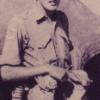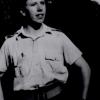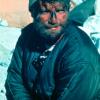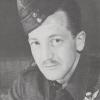An article in the Airborne Engineers Association Newsletter, January 1998, by Historian, Fred Gray.
“ESCAPE”.
During the Second World War a great many British servicemen attempted to escape and rejoin their own forces. Some succeeded but many failed. Very few escaped twice and only a small number were successful on both occasions.
One who did evade capture on two escape attempts was John Humphreys. The first attempt whilst a prisoner of the Italians, and the second immediately after the battle of Arnhem. Although recommended for the Military Medal for his conduct at the Arnhem Bridge, John was denied the award. Being awarded the OBE later in life in some way offset this disappointment.
‘MY FIRST ESCAPE’.
By John E. Humphreys.
It was a bit chilly at 0600 hrs as I clambered out of the bottom of the slit trench, but I knew that in a short time it would soon be like living inside a furnace as the sun rose over the Libyan Desert. Tobruk was beside the sea but it was still a very hot place in June and unknown to me then, it was going to get a lot hotter. I joined the Field Company in 1940 and for the past two years had been in Africa. It had originally been a TA unit, but by now was composed of TA, Bevan Boys, Regulars and Volunteers as we had lost quite a lot over the past two years and was probably the reason why I was a L/Sgt at the age of twenty.
There were six of us sharing two trenches, dug in on the west side of Tobruk harbour and we had been detached from the Company for some weeks, having been tasked to prepare all the harbour installations for demolition. This comprised of all harbour installations, eight water towers, the water distillery and the Bakery.
The task was almost finished; today would see it completed. Meanwhile we had the usual start to the day. The drill was for one to make tea and the others to get breakfast cooking, which we did over cut down petrol flimsies filled with sand, into which petrol was poured. The fire would last long enough to boil the water and cook the tinned bacon, sausages, etc.
We had just started eating when very intensive shelling started. This was unusual as we had become accustomed to the Stuka’s doing their three times a day bombing run, but shelling we had not experienced for some time. The guns went quiet, but then the drone of heavy bombers was heard and we got plastered again, this was followed by the familiar sight of the Stuka’s and then the pattern was repeated again and again as the day wore on. It was obvious the ‘Jerries’ were putting in an attack, but there was little we could do except stay in our slits and wonder what was happening farther west.
We found out about 1600 hrs when the noise of tank tracks was heard and through the dust and smoke appeared four tanks with white crosses painted on them, heading straight towards us. As we were armed with rifles and a Tommy Gun, the sensible thing to do was to sit on the bottom of the slit and let them roll over us, which they did. I had seen nothing of my Company Officers all day and being a product of the pre-war Regular Army, was sufficiently brainwashed to follow orders to the letter. My last orders had been to refrain from carrying out any demolition's, until I was in receipt of an AF4012A signed by an officer. I waited for half and hour then got out of the slit, jumped into the truck that we had and headed for the docks where I thought my OC might be. On the way there I actually drove through the tanks that I had seen previously without them firing a shot at me. Sure enough my OC was at the docks trying to get on one of the LTC’s that were attempting to leave.
In my ‘brainwashed’ Regular Army way, I went up to him saluted and asked him to sign my AF4012A. He started jumping up and down and screaming that I should have blown them by now, so I saluted again, turned around and ran back to the truck and drove back to where I had left my section, once more passing through the ‘Jerry’ tanks. They must have thought that I was one of them in a captured vehicle, as again I was not shot at.
It was now dusk with a lot of-noise, smoke and dust so we were able to blow up the bakery and distillery without interference and then started on the water towers. By this time it was almost dark and the tracer rounds were visible, making it easier for me to work my way around to the first tower, fit the initiation charge, light the safety fuse and move on to the next one. All but three had been blown when I realised there was only Sapper Saunders and myself left of the section and by now the machine gun fire was getting intense, as though the enemy realised what was happening. We were now at the last one and quickly fitted the initiation set, lit the fuse and got into a shell hole and lit a Victory V, the cigarettes that we got with the rations. I had smoked mine and the charge had still not gone off, so I got up and walked towards the tower thinking there had been a misfire. I was about thirty feet away when it blew, I can still see the tower cracking across the base then splitting down the middle with the water pouring out and the next thing I knew, Saunders was asking me if I was alright. I no doubt looked a lot worse than I felt, covered in dust, dirt and blood, but fortunately I was only suffering from the blast effects, which was not severe!
Our task completed, the next thing on our minds was how to get out of Tobruk without being taken prisoner. All around we could hear foreign languages, so I decided to ‘leg it’ to the ruins of the bakery where we had left our kit, only to find 20 or 30 others there and two officers from the RASC who were unloading their revolvers and preparing to surrender. Having been in Tobruk almost six months, I knew it well and explained to the officers that if we could get to the south side of the harbour there were a number of folding boats there in a concealed place. We could use them to make our way east along the coast. They agreed and at first light we formed up in three ranks and without weapons, marched in an orderly manner for three hours past columns of POW’s being escorted in the opposite direction and nobody took the slightest notice of us. Difficult to believe, but true! We got to the boats, but found there were no oars, so I volunteered to go to the boat store about half a mile away and see if they were there and then my luck ran out. A firefight broke out quite near and the sound of ‘Jerry’ mortars was clearly heard. This was the last thing I heard until I realised that I was lying on my back looking up at a big ‘Jerry’ Feldwebel who said to me “Tommy, for you the war is over”. A feeling of complete desolation came over me as I realised that I was going to go ‘In the bag’. They treated me well , gave me a tin of cigarettes (looted from the NAAFI) called up an ambulance and sent me off to the hospital in Derna where I was treated for a head wound and eventually transferred to the POW cage. A couple of weeks later the cage was emptied and all of us marched to a ship, where we were battened down below decks. We were now in the hands of the Italians who seemed to get braver the farther they were from the front line.
The boat docked at Brindisi where we disembarked and were paraded through the town as an example of Italian superiority. This fell rather flat as the local women handed out cigarettes, fruit and water despite opposition from the Carabinieri. From there we went to PG66 which was at Lucca near Pisa, but we didn’t get to see the Leaning Tower, nor did we get much else. We were fed once a day, a small piece of bread and some gruel, which was supposed to have rice and vegetables in it, but I could never find any!
This was about the time that I decided that I would have to do something about escaping. Most of my fellow prisoners seemed content to stay in captivity as it got them away from the war, but my Regular Army training was pricking my conscience and my belly; telling me to fill it! This did not appear to be too difficult, as the sentries were a ‘sloppy’ lot and there was only a single fence around the camp with a culvert drain running underneath it beside one of the sentry boxes.
If I could get to the culvert at night without being seen I could escape. It proved to be that easy, but not what I had not bargained for, as once in the country I became very conspicuous in my shorts, shirt, boots and puttees! I was soon back in the camp and not long after; sent to PG70 near Ancona on the north East Coast of Italy.
This was a well established camp and housed a few thousand divided up into groups of a hundred, each group commanded by a Sgt. The hundred was split into quarters and each man had a number from one to hundred. The number was used to determine whose turn it was to fetch the daily meal from the cookhouse, two men would carry the pot and they would get an extra cup of the soup that day. The numbers were also used to draw lots for the slice of bread and piece of cheese that was issued around 1100 hrs. Cheese we received five days a week the other two was supposed to have meat in the vegetable soup. I was lead to believe that we would get a Red Cross parcel every week, but that was wishful thinking, if we were lucky we might get one every six weeks and it was these that kept most of us alive, even so I was down to seven stone.
I got to that camp in October still dressed in KD but soon after was issued with a Greek Army uniform jacket and trousers, which looked very much like that worn by the Italian guards. The daily routine hardly ever changed; up at reveille, wash and shave, get a cup of what they called coffee then roll call , which could take anything up to two hours. Bread and cheese was served at midday with the ‘KLIM’ tin of soup. Not having mess tins, we all used the empty milk tin from the Canadian Red Cross parcels. That was it, until the evening roll call the afternoons were spent in different ways by different people, some engaged in theatrical productions, some were taking degree courses and others like me were doing their best to keep fit. Very few of the POW’s were interested in escaping, quite the reverse, they objected to the upheaval when someone did try.
The winter came and went and in the Spring I became friendly with a few whom thought as I did about getting out. The guards, who must have been tipped off, found the tunnel that we were digging! The plan to escape by spending the night on the roof and slipping out with the wood carrying party came to naught and all I was getting, were a few days in the cooler! It was obvious to me, if an escape were to be successful it would have to be planned in secret with no more than three people involved. One of us would have to be a fluent Italian speaker; so with the aid of a Hugo’s Italian grammar book and all the time in the world, assisted by a bored sentry with whom I used to converse when he was on duty, I could speak it well enough to get by.
I had to devise a plan that stood a good chance of succeeding, but which I could plan alone. I started by watching the wicket gate that was used by the sentries entering the compound and which was also used by the food orderlies. I noted that the sentries paid little attention as to who went in and out, as the way only lead to their barracks. But, I thought, supposing I could get through the gate without being challenged and into the Italian ‘hutted’ barracks, then hide under one of the huts until nightfall. The next time that I was food orderly I looked closely at the barrack huts and sure enough they were built on piers above the ground. It was possible to slide underneath and remain hidden. From there it was easy to get over the wall, which was not guarded and ‘leg it’ for the hills.
I asked one of the theatre crowd to make my jacket look like an Italian Sergeant, on the pretext that it was going to be use in a skit. When it was ready I hid it and explained my plan to ‘Dick’ Williams and Bernard Duffy who were also keen to escape. After the evening roll call we waited until the guards had returned to their barracks and I then marched them up to the gate as though I was taking them to the Admin Block. If the sentry stopped me I was going to say they were being taken to the Commandants Office for punishment and it was as easy as that. The light by then was going and we slid under one of the huts until dark, then climbed the perimeter wall and ‘legged it’ for the hills.
The first week we kept to the country tracks and only moved at night. At first light we would look for a farmer’s field and help ourselves to whatever was edible, usually tomatoes, figs, grapes and occasionally eggs or the luckless chicken, then hole up for the day. After a week we got a bit bolder and started walking by day, with me in front to do the talking if it was necessary. It was about this time that we persuaded a farmer to swap some of his old clothes for the ones that we were wearing and to our surprise he was more than willing. We were now dressed in an assortment of rags, but not as conspicuous as we had been. The days went by without incident, the bridges we avoided and swam the rivers at night and still on the country tracks. I cannot remember how may days passed before we came to the Grand Sasso, a mountainous range that meant we would have to go down through
Pescara, unless there was an easy route over it and there was. I asked and was told that a train service ran from a village a few miles away and went from one side of the mountain to the other. Well, we had money. We had bumped into a few deserting Italian soldiers and some officers and had relieved them of their cash knowing that it might be needed and there was nothing that they could do about it without giving themselves away. Off to the station we went where I bought three newspapers and told the others not to speak but just keep their heads in the paper. I bought the tickets without bother and we got on the train and stayed there until it had got around to the other side. I think that some of the passengers were suspicious, but they didn't say anything.
We were now getting too ‘cocky’ for our own good, moving in daylight and with the money that we had, we were thinking of buying a big meal and so made our way in to Foggia. All went well until we were leaving the town, when a nosy Carabinieri stopped us and started asking questions. Fortunately it was late evening and not too difficult to get rid of him, but it taught us to stay on the tracks. Some day’s later we were approaching an autostrada in order to cross it and as usual I was well in front of the other two and about to step onto the road when a German Convoy came roaring up from the south.
I stood still hoping to be ignored and scared stiff that I would be recaptured after having come so far. The trucks and half-tracks went past, but behind them were motor cycles with sidecars on which were mounted machine guns. One of these stopped opposite me and I thought ‘Oh, Hell, this is it and we were out of uniform’, but the rider asked in very broken Italian where he could get water. Luckily we had just crossed a river so I was able to tell him and he then took off and so did I.
By now we had found that the local peasantry, the ‘Contadina’, who disliked the Germans and were friendly towards us, so that we could often get fed in the evening at one of the farmhouses. On one occasion we were settled in the farm kitchen and I was talking to the occupants and they seemed to think that I was an Italian deserter and not an Englishman. When I asked them why they said “Voi parla Italiano la lingua Toscana e bocca Romana”. That is the equivalent of Oxford English and I could only assume that the friendly sentry to whom I used to speak to was the son of wealthy parents. Continuing to head south we seemed to be in an area where all the villages were built on hilltops and it was a slog up and slide down. Walking into one village on a Sunday evening we watched the young
men and women promenading around, eyeing each other up and looking askance at these three scruffy strangers, when I heard above the normal conversation someone excitedly saying that there were English soldiers in the next village. I pushed my way through the crowd and asked him where and he pointed to the next village on yet another hill, so off we went. When we arrived we found the market place full of people looking at four armed jeeps in which were soldiers wearing P.P.A. titles on their battle dress.
Well, I thought we have made it and fought my way to the front of the crowd only to be told to “F*** Off, you scruffy ‘Itie’ bastard”. His eyes popped out when I replied in like vein and in no time we had convinced them that we were Brit ex POW’s. Later that evening they drove us to Bari and that was where I saw the maroon beret for the first time.
They handed us over to the I.O. of the 1st Para Brigade where I underwent an extensive debrief and was then told to find accommodation with the 1st Para Squadron, R.E. who were just up the road. Sometime later we were on our way to Algiers then Glasgow to be given six weeks leave. Whilst on leave I received a letter from R.E. records, congratulating me on my escape, but pointing out that I would have to revert to my substantive rank of Corporal, as I had not practised my trade for twelve months! I would have to revert to non-tradesman status, so with a few scrawls of the pen my pay was reduced to less than half of what it was!
Quite a welcome home, in the infantry they got medals!
Source:
Airborne Engineers Newsletter January 1998 written by Fred Gray
Read More




Latest Comments
There are currently no comments for this content.
Add Comment
In order to add comments you must be registered with ParaData.
If you are currently a ParaData member please login.
If you are not currently a ParaData member but wish to get involved please register.